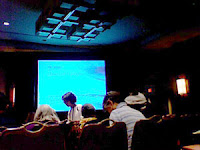
When putting together our webpage about Turn off Your Television Week, I came across a social group whose mission is to get people to turn off their televisions every week. Their quizzes about media and television addiction are included on our page.
For someone like myself who is a media addict (mostly computer, very little tv), some of the questions are almost laughable: do you have a tv in your bedroom (uh.. who doesn't?), can you tell time by what tv show is on (um.. yeah, giggle.) But others are kind of not so funny: do you watch tv/spend time on a computer more than you talk to your family? (um.. heh.)
It's really easy to get carried away in our hobbies, especially when they seem more compelling than other, boring things. I know most of the people I hang out with online say this is their socially interactive alternative to just watching TV. Is it better? Perhaps. Is it still keeping us indoors, breathing stale lint bunnies instead of fresh prairie air? Yeah.
The staff at the Jasper County Library has made an effort again this year to bring you a week of quality family events you can do instead of hang out around the flickering screen. Whether you choose to spend this week with us or doing something else exciting in the wonderful weather, we hope you spend it well.
Even just one week of vacation away from our social addictions can give us a new look on things.

